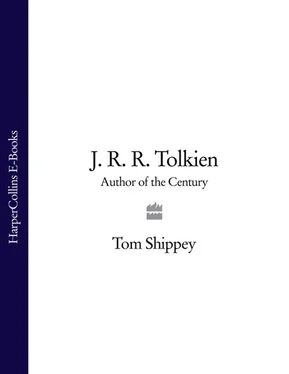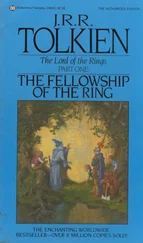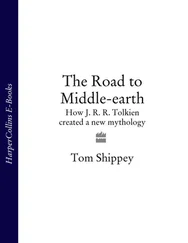J. R. R. Tolkien
Author of the Century
T.A. Shippey

Cover Page
Title Page J. R. R. Tolkien Author of the Century T.A. Shippey
Foreword
CHAPTER I
CHAPTER II
CHAPTER III
CHAPTER IV
CHAPTER V
CHAPTER VI
Afterword
List of References
Index
Acknowledgements
Copyright
About the Publisher
Foreword
AUTHOR OF THE CENTURY
Fantasy and the fantastic
The dominant literary mode of the twentieth century has been the fantastic. This may appear a surprising claim, which would not have seemed even remotely conceivable at the start of the century and which is bound to encounter fierce resistance even now. However, when the time comes to look back at the century, it seems very likely that future literary historians, detached from the squabbles of our present, will see as its most representative and distinctive works books like J.R.R. Tolkien’s The Lord of the Rings, and also George Orwell’s Nineteen Eighty-Four and Animal Farm, William Golding’s Lord of the Flies and The Inheritors, Kurt Vonnegut’s Slaughterhouse-Five and Cat’s Cradle, Ursula Le Guin’s The Left Hand of Darkness and The Dispossessed, Thomas Pynchon’s The Crying of Lot-49 and Gravity’s Rainbow. The list could readily be extended, back to the late nineteenth century with H.G. Wells’s The Island of Dr Moreau and The War of the Worlds, and up to writers currently active like Stephen R. Donaldson and George R.R. Martin. It could take in authors as different, not to say opposed, as Kingsley and Martin Amis, Anthony Burgess, Stephen King, Terry Pratchett, Don DeLillo, and Julian Barnes. By the end of the century, even authors deeply committed to the realist novel have often found themselves unable to resist the gravitational pull of the fantastic as a literary mode.
This is not the same, one should note, as fantasy as a literary genre – of the authors listed above, only four besides Tolkien would find their works regularly placed on the ‘fantasy’ shelves of bookshops, and ‘the fantastic’ includes many genres besides fantasy: allegory and parable, fairy-tale, horror and science fiction, modern ghost-story and medieval romance. Nevertheless, the point remains. Those authors of the twentieth century who have spoken most powerfully to and for their contemporaries have for some reason found it necessary to use the metaphoric mode of fantasy, to write about worlds and creatures which we know do not exist, whether Tolkien’s ‘Middle-earth’, Orwell’s ‘Ingsoc’, the remote islands of Golding and Wells, or the Martians and Tralfa-madorians who burst into peaceful English or American suburbia in Wells and Vonnegut.
A ready explanation for this phenomenon is of course that it represents a kind of literary disease, whose sufferers – the millions of readers of fantasy – should be scorned, pitied, or rehabilitated back to correct and proper taste. Commonly the disease is said to be ‘escapism’: readers and writers of fantasy are fleeing from reality. The problem with this is that so many of the originators of the later twentieth-century fantastic mode, including all four of those first mentioned above (Tolkien, Orwell, Golding, Vonnegut) are combat veterans, present at or at least deeply involved in the most traumatically significant events of the century, such as the Battle of the Somme (Tolkien), the bombing of Dresden (Vonnegut), the rise and early victory of fascism (Orwell). Nor can anyone say that they turned their backs on these events. Rather, they had to find some way of communicating and commenting on them. It is strange that this had, for some reason, in so many cases to involve fantasy as well as realism, but that is what has happened.
The continuing appeal of Tolkien’s fantasy, completely unexpected and completely unpredictable though it was, cannot then be seen as a mere freak of popular taste, to be dismissed or ignored by those sufficiently well-educated to know better. It deserves an explanation and a defence, which this book tries to supply. In the process, I argue that his continuing appeal rests not on mere charm or strangeness (though both are there and can again to some extent be explained), but on a deeply serious response to what will be seen in the end as the major issues of his century: the origin and nature of evil (an eternal issue, but one in Tolkien’s lifetime terribly re-focused); human existence in Middle-earth, without the support of divine Revelation; cultural relativity; and the corruptions and continuities of language. These are themes which no one can afford to despise, or need be ashamed of studying. It is true that Tolkien’s answers will not appeal to everyone, and are wildly at odds with those given even by many of his contemporaries as listed above. But the first qualification applies to every author who has ever lived, and the second is one of the things that make him distinctive.
However, one of the other things that make him distinctive is his professional authority. On some subjects Tolkien simply knew more, and had thought more deeply, than anyone else in the world. Some have felt (and said) that he should have written his results up in academic treatises instead of fantasy fiction. He might then have been taken more seriously by a limited academic audience. On the other hand, all through his lifetime that academic audience was shrinking, and has now all but vanished. There is an Old English proverb that says (in Old English, and with the usual provocative Old English obscurity), Ciggendra gehwelc wile pœt hine man gehere, ‘Everyone who cries out wants to be heard!’ (Here and in a few places later on, I use the old runic letters þ, ð and 3. The first usually represents ‘th’ as in ‘thin’, the second ‘th’ as in ‘then’. Where the third is used in this book, it represents -3 at the end of a word, -gh- in the middle of one.)
Tolkien wanted to be heard, and he was. But what was it that he had to say?
For a full account of Tolkien’s life, one should turn to Humphrey Carpenter’s authorized Biography of 1977 (full references to this and other works briefly cited in the text can be found on pp. 329-36 below). But one could sum it up by noting Carpenter’s surprising turn on p. Ill: ‘And after this, you might say, ‘nothing else really happened’. The turning-point Carpenter refers to as ‘this’ was Tolkien’s election to the Rawlinson and Bosworth Chair of Anglo-Saxon in Oxford University in 1925, when he was only thirty-three. The exciting events of Tolkien’s life – the stuff most biographers draw on – happened before then. He was born in 1892, in Bloemfontein, South Africa, of English parents. He returned to England very soon, but his father died when he was four, his mother (a convert to Roman Catholicism) when he was twelve. He was brought up in and around Birmingham, and saw himself, despite his foreign birth and German-derived name, as deep-rooted in the counties of the English West Midlands. He met his future wife when he was sixteen and she was nineteen, was eventually forbidden by his guardian to see or correspond with her till he was twenty-one, and wrote proposing marriage to her on his twenty-first birthday. They married while he was at Oxford, but immediately on graduation, in 1915, he took up a commission in the Lancashire Fusiliers. He served as an infantry subaltern on the Somme from July to October 1916, and in that year lost two of his closest friends, killed outright or dead of gangrene. He was then invalided out with trench fever, worked for a short while after the War for the Oxford English Dictionary, received first a Readership and then a Chair at Leeds University, and then in 1925 the Anglo-Saxon Chair at Oxford.
Читать дальше













